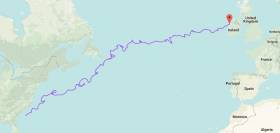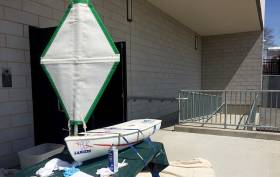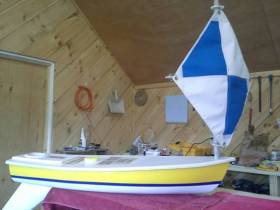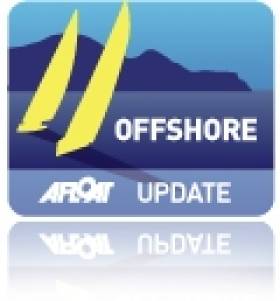Displaying items by tag: unmanned
Another Unmanned Sailboat Makes Landfall On Ireland’s West Coast
#Unmanned - School children in South Carolina in the USA are awaiting news on the whereabouts of their unmanned sailboat that made landfall in Ireland's North West this past week.
As WCSC Live 5 News reports, the miniature vessel named Cruiser was believed to be on its way to a school in Bangor Erris after reaching the Co Mayo mainland near Achill Island on Wednesday (11 October), some five months after it was launched by students at Harbor View Elementary in Charleston.
If you have any information as to Cruiser’s current whereabouts, you can get in touch with the school HERE.
The news comes six months after the miniature unmanned yacht Lancer was returned to the ocean after sailing from the north east US to Connemara — and bringing together the Connecticut high schooler behind the marine science project with the Galway girl who found the boat near her home.
In July, Lancer was tracked on a return course to Ireland. The boat finally made landfall near Plymouth in Devon last month, but its current whereabouts are unknown.
Unmanned Mini Yacht Found In Connemara After Search Appeal
#Unmanned - Following our previous alert for an unmanned yacht off the Galway coast, the mini-yacht has been found after making landfall.
Kaitlyn Dow's self-built vessel Lancer was launched off the US coast four months ago as part of a high-school marine science project.
The now final-year student at Waterford High School in Connecticut tracked her sailboat by GPS across the Atlantic as it inched towards Galway Bay and Connemara.
It was finally recovered this past Saturday 17 September by eight-year-old Maedhbh Ní Ghionnáin on an island near her home in Lettermore, as The Day reports.
After her aunt received an email from Dow asking for any details of her boat's whereabouts, Maedhbh's family had been keeping a lookout before they found it on a beach virtually on their doorstep.
“In the middle of the day we went walking by the sea, and then we saw this white thing,” said Maedhbh, who also shared the story of her remarkable discovery with Raidió na Gaeltachta.
The news comes a month after another unmanned research sailboat was reported off the Kerry coast after nearly three years in the North Atlantic.
Unmanned Research Boat Spotted Off Kerry Coast
#Unmanned - A miniature unmanned sailing boat has been reported off the Kerry coast after nearly three years in the North Atlantic.
The boat, named West, is part of the Educational Passages project by the Middle School of Westbrook in Maine, USA and is one of five boats the Sebago School Alliance sent out in the autumn and winter of 2013-14.
West was launched off Georges Bank along with one other boat by Bro Cote, a lobsterman out of Hyannis, Massachusetts. Several others were launched about the same time off the Mid-East coast of the United States and off the Canary Islands for the marine science project.
“We had hoped the boat would make the complete circle of the Atlantic Ocean. It has and then some,” say the project organsiers about West, which has been spotted 32 nautical miles from the Kerry coastline.
West could arrive in the Kerry area over the next few days or, depending upon weather conditions, may go further northwards towards the Galway coast.
Previously West made landfall in November 2014 when it crashed on rocks in rough seas off Portugal, where it was recovered by local authorities and repaired with the help of local companies and relaunched from Lisbon in June last year.
Four months later, it was recovered entering the Mediterranean, refurbished again and put on a cargo ship to Madeira and relaunched from there on 28 January this year.
The project co-ordinators have asked for assistance to help rescue the boat when it arrives in the coming days
“It would be great if the boat could be recovered at sea or shortly after landing to avoid damage."
































































